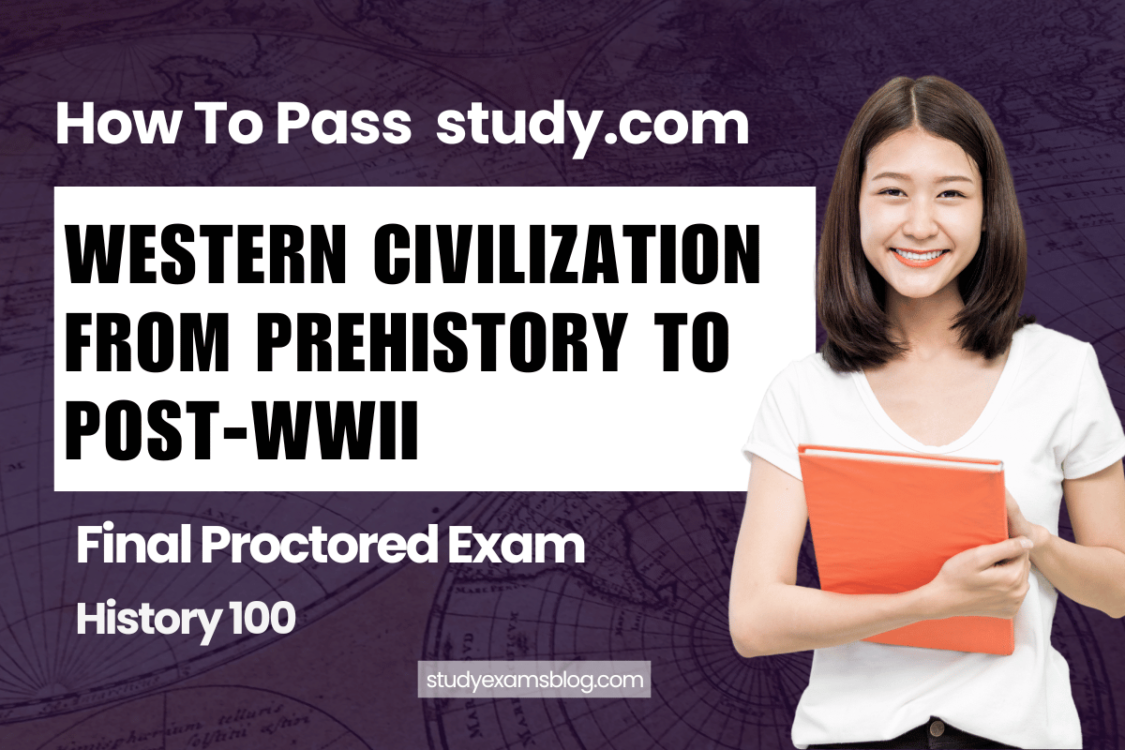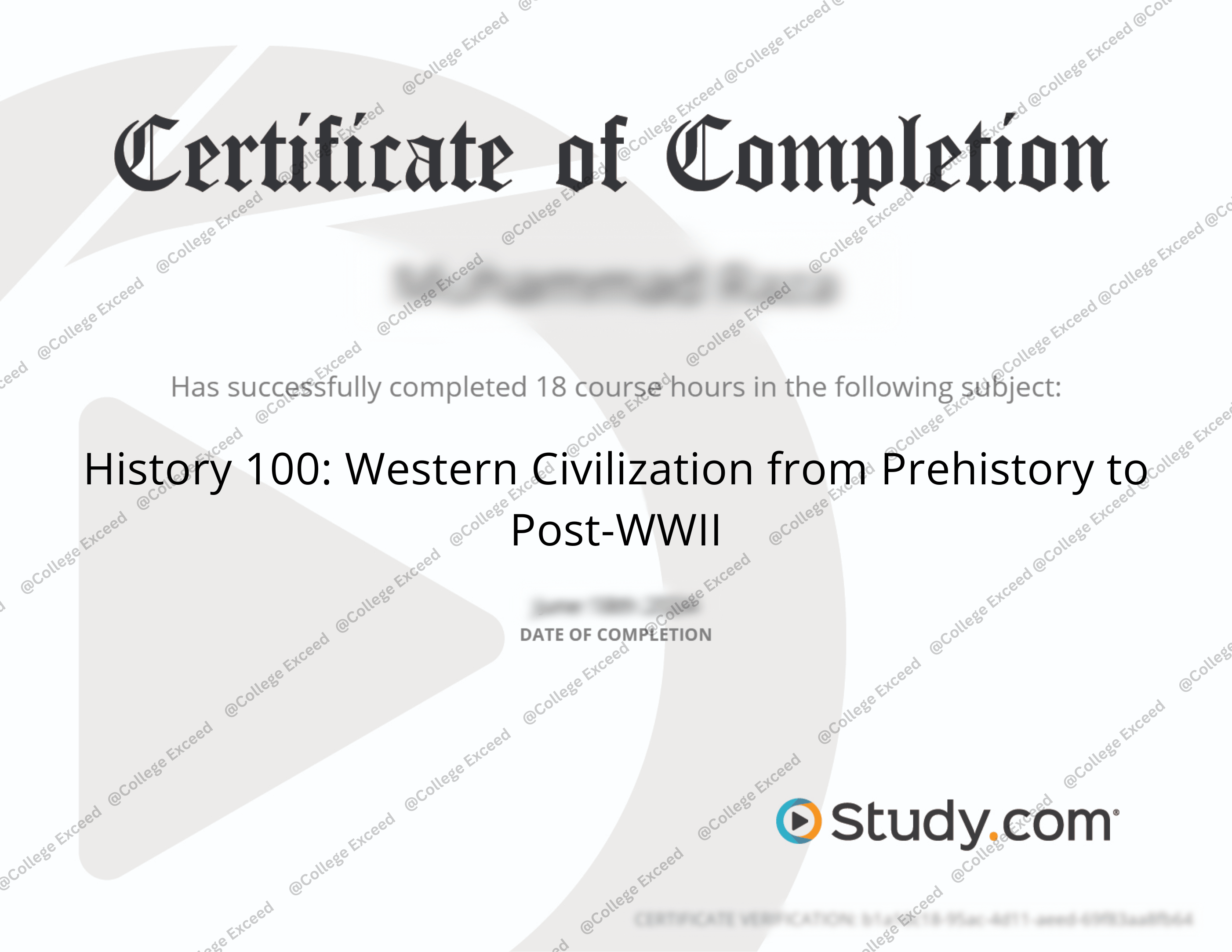
-
Gavin Walton
- October 20, 2024
Welcome to the world of lecture halls, book readings, and note-taking with study.com’s History 100: Western Civilization from Prehistory to Post-WWII! Are you a history lover or simply a student who wants to know everything, to pass his exams with good results – welcome to the website! This class is not just about rote, rote remembering of a date and a name – it is about societies and cultures and how they changed over time or were formed and influenced. Beginning with Mesopotamian civilizations up to the post-WWII realignments of global powers, this course will give an understanding of how the world was constructed.
Now, if you are intimidated, don’t be, because even some of the most prodigious writers get self-conscious at times. Historically, history may appear as an unending calendar of events; however, if the link between the various events is made, nothing makes as much sense anymore and in fact, it may become quite fun. This class is about all the major events in human history such as empire building and collapsing, different kinds of revolutions, the emergence of the main religions, and the Industrial Revolution to name but a few. By the end of it, you will be an exam pro and also have the additional enjoyment of knowing some cool Australian history trivia to share and amaze your friends with. Okay, I think you’re ready for an exciting virtual time travel now!
---

What to Expect from Study.com History 100 Class📖
In study.com History 100: Western Civilization from Prehistory to Post World War II; You are about to embark on a detailed overview of the millennium events of importance to Western society. So you’re asking, “We are not there yet, are we?”, right? Don’t worry; I have no intention of taking the ‘deep end’ plunge right away! This class will take you through the basics of human history from early civilizations to today’s world’s conflict repercussions. When you learn about these periods you will be able to realize how history is indeed connected and how it still affected the present.
The course will begin with the history of the earliest empires of Mesopotamia and Egypt, followed by the classical epochs of Greece and Rome. Believe me, this section is going to be very valuable for your exam – the Roman Empire in its races and its decline is a very popular subject. Finally, we’ll get to the last epoch known as the Dark Ages, where there was a complete transformation of society by the advent of Christianity and the structure of the feudal system. As we move forward, you’ll dig into the Renaissance (spoiler alert: The Renaissance, which is more than just pretty paintings, and the Reformation periods that radicalized ideas, art, and religion.
Last but not least, the twentieth century and nineteenth centuries – the two game changers. All of them started from the Industrial Revolution era, up to World War I and II where these events cast a great historical impact not only on Europe but on the international community in terms of politics, economics, and social structures. Make sure to pay a lot of attention to World War I and II for they are usually asked regarding their causes and effects most of the time. Learn about the general structure of the history timeline: from ancient empires to the present day, and make sure you’ll succeed in the exam!
Week-by-Week Study Plan to Ace Study.com History 100 Exam📝
Now that we are aware of what to look forward to, let us discuss the week-by-week study plan to help you ace the final exam. Stick to this guide and we guarantee your success in the final challenge!
Week 1: Ancient Civilizations
Focus: Prehistory of Rome
- Begin with Mesopotamia, Egypt, and Greece. Focus on their governments, religions, and cultural innovations.
- Don’t forget Ancient Rome! It’s vital to understand how Roman culture shaped Europe.
- Quick Link: Khan Academy playlist on Ancient Civilizations
Week 2: Fall of Rome & Middle Ages
Focus: Societal Structural Changes: ‘Fall of Rome’, ‘Feudalism’ and Christianity
- Learn about the decline of the Roman Empire and feudalism in medieval Europe and the role of the Christian church.
- Quick Link: Crash Course on the Fall of Rome
Week 3: Renaissance & Reformation
Focus: Renaissance and Religious Changes
- Explore the Renaissance’s artistic and scientific impact. Then cover Martin Luther and the Reformation.
- Quick Link: BBC Teach on the Reformation
Week 4: Enlightenment & Revolutions
Focus: Enlightenment Thinkers & Revolutions
- Understand Enlightenment key leaders such as John Locke, and Voltaire, and their roles in the American and French Revolutions.
- Quick Link: Enlightenment Thinkers Flashcards
Week 5: Industrial Revolution & Nationalism
Focus: Industrialization & European Expansion
- Focus on the Industrial Revolution’s causes and how nationalism fueled European imperialism.
- Quick Link: Summary of the Industrial Revolution
Week 6: World Wars
Focus: WWI and WWII
- Study the causes, key battles, and consequences of both World Wars.
- Quick Link: World War I Overview
Week 7: Cold War & Modern History
Focus: Cold War and the Fall of the Soviet Union
- Know about the Cold War, the arms race, and its impact on world politics.
- Quick Link: Crash Course on the Cold War
Week 8: Review & Practice
- Use this week to review your notes, take quizzes, and practice tests.
- Quick Link: Western Civilization Flashcards
Keep it simple, stay consistent, and by the end, you’ll be fully ready!
---
Exploring History Beyond the Textbook: Free Study Resources📂
It is always better to have some reliable external sources; this is so because some issues, though general, seem to be a bit sensitive. Below are links you can visit in order to find more information regarding study.com History 100: Western Civilization from Prehistory to Post-WWII:
YouTube Channels
- CrashCourse History – This without a doubt is one of the best YouTube channels for simple, fun, and exciting history classes. They have a Playlist of ancient civilizations, Middle Ages, and World War playlists.
- Khan Academy History – Dive into comprehensive explanations of world history topics, with great visuals to break down complicated ideas.
- TED-Ed – Ideal for short, animated videos on specific historical events and ideas. Great for visual learners who prefer bite-sized lessons.
Flashcards and Study Tools
- Quizlet – Western Civilization – A goldmine for flashcards, including terms, dates, and key figures from Western Civilization.
Quizlet Flashcards for Western Civilization
- History Flashcards on StudyStack – Another excellent tool for testing your knowledge with flashcards, especially for topics like the Enlightenment, Industrial Revolution, and World Wars.
StudyStack History Flashcards
Articles and Online Libraries
- History.com – A reliable source for articles on significant events and key figures in Western civilization.
- BBC History – Great for in-depth articles, timelines, and expert insights into historical topics, from Ancient Greece to the World Wars.
BBC History
All the additional assistance you may want should be available with these resources. Most importantly they are free; easily accessible and can easily intertwine with the study schedules.
---
Key Historical Events and Concepts You Should Know 🔑
Now that you have your study plan and external resources, let’s dive into some of the key topics from study.com History 100: Western Civilization from Prehistory to Post-WWII. To make these topics easier to digest, I’ll break them down into a few essential comparisons and tables. These topics are frequently tested, so mastering them will significantly boost your chances of acing the exam.
- The Roman Empire vs. The Byzantine Empire
Feature | Roman Empire | Byzantine Empire |
|---|---|---|
Capital | Rome | Constantinople |
Main Religion | Polytheistic, later Christianity | Christianity (Eastern Orthodox) |
Language | Latin | Greek |
Duration | 27 BCE – 476 CE | 330 CE – 1453 CE |
Legacy | Roman law, architecture, and roads | Preservation of Greco-Roman culture, Orthodox Christianity |
Takeaway: While both empires played vital roles in shaping Western civilization, the Roman Empire laid the foundation, while the Byzantine Empire preserved it, especially during the Dark Ages.
- The Industrial Revolution: Positive vs. Negative Impacts
Aspect | Positive Impact | Negative Impact |
|---|---|---|
Economy | Rapid industrial growth, the rise of factories | Exploitation of workers, child labor |
Social Changes | Growth of cities, new job opportunities | Poor living conditions in crowded urban areas |
Technology | Advances in steam engines, railroads, and textiles | Environmental damage due to increased pollution |
Labor Movement | Creation of unions to protect workers’ rights | Resistance from factory owners, slow reforms |
Takeaway: The Industrial Revolution was a double-edged sword—while it propelled economies forward, it also brought significant social challenges, many of which sparked the labor rights movement
- Renaissance vs. Enlightenment
Feature | Renaissance | Enlightenment |
|---|---|---|
Time Period | 14th–17th centuries | 17th–19th centuries |
Focus | Rebirth of classical art, science, and culture | Reason, logic, and individual rights |
Key Figures | Leonardo da Vinci, Michelangelo | John Locke, Voltaire, Rousseau |
Main Achievements | Artistic masterpieces, advances in humanism | Development of political philosophy, social contracts |
Impact | Cultural flourishing, the start of modern science | The foundation of modern democracy and civil rights |
Takeaway: While the Renaissance focused on reviving classical culture and art, the Enlightenment emphasized reason and political thought, laying the groundwork for modern democratic societies.
- World War I vs. World War II
Feature | World War I | World War II |
|---|---|---|
Time Period | 1914–1918 | 1939–1945 |
Causes | Nationalism, alliances, the assassination of Archduke | Expansionism, fascism, Treaty of Versailles |
Major Players | Allied Powers (France, Britain, Russia) vs. Central Powers (Germany, Austria-Hungary) | Allied Powers (USA, UK, USSR) vs. Axis Powers (Germany, Italy, Japan) |
New Technology | Trench warfare, tanks, machine guns | Atomic bombs, aircraft carriers, jet engines |
Outcome | Treaty of Versailles, League of Nations | United Nations, Cold War |
Takeaway: Comparing these two wars, it can be stated that although both were destructive, World War II had a more significant impact around the globe: the appearance of the United Nations, and the start of the Cold War.
There is much more we can talk about regarding these topics, all these comparisons are just a start; however, it should be enough to make sure you have a good base for understanding the topic. Why not? These areas appear most of the time on exams!
---
Study.com History 100 FAQ❓
Q: I am wondering how I can remember all the events and dates
A: Incorporate timelines and other graphic displays! There is no shortage of timeline templates on the web (not to mention there are even some pretty engaging ones) to use when you want to list the events in chronological order. Plain and simple, do not memorize the dates but try to grasp the flow and causal relation between one event and another.
Q: Is there a lot of overlap between historical periods?
A: They do partially, indeed, but that is really not a crucial aspect of the conversation at all in any case either. For instance, the Enlightenment is a continuation of the Renaissance, and the two world wars are interrelated in terms of causations and effects. Such correlations will enable you to identify the sequence of history and how the different evolution periods are related.
Q: How can I deal with the amount of content in this course?
A: Get down to your preparation well in advance and stick to a schedule. So do not attempt to pack all your lessons in the one week prior to the exam. It is helpful to consider big ideas first (the great wars, revolutions, and philosophical directions), then move to the particulars as soon as your perception of the world has changed. Moreover, make use of additional content such as videos, podcasts, and practice quizzes so as to consolidate your learning.
Q: Will I need to memorize a lot of dates and names?
A: The dates you should remember are anecdotal dates such as 1492 for Columbus or 1914 as the beginning of WWI; however, instead of rote learning of dates, most exams will test the students on the causal factors of certain events and their consequent impacts. It is crucial to understand how things happened and which historical personalities have important meanings instead of memorizing all the details.
Q: How much do primary sources play a role in this course?
A: Original sources are valuable to help let the reader study history from the insider’s view. Although the subject and the course are dedicated to the big ideas and the large picture, the study of some of the primary sources such as the letters, the speeches, and the declarations may help to provide the picture of the given time period.
---
Summing Up: Reflecting on Your Historical Journey 📄
You’ve got this! Study.com Western Civilization from Prehistory to Post-WWII course is an interesting subject matter as it recreates history in detail, it is essential in the understanding of how the world came to be as it is today. You just have to study the concepts that are a bit hard for you to understand and then use external resources effectively, you need to stick to the timetable in order to get through this exam. As you study, always keep in mind that it is not only required to reproduce various facts but also describe the relation between the events that occurred and the further evolution of the world and modern culture.
Some of you might think that at the end of this course, you will be overwhelmed, but if properly organized and if you know what topics are important, you will be just fine. Business school study sessions should be enjoyable, don’t hesitate to take a break whenever you feel like it and use all the great stuff out there. Good luck!



